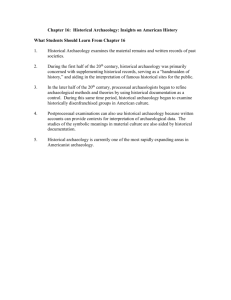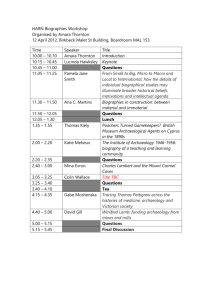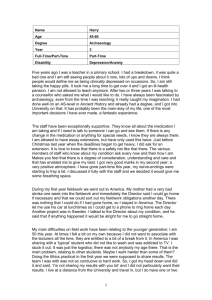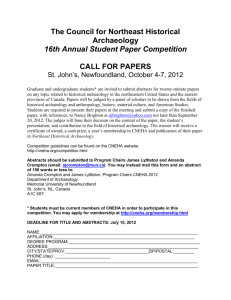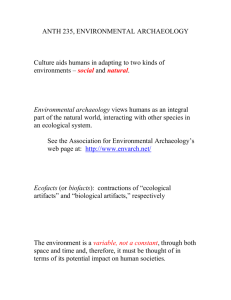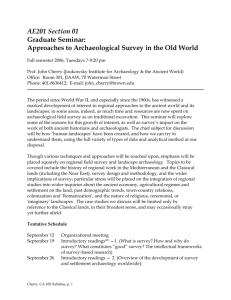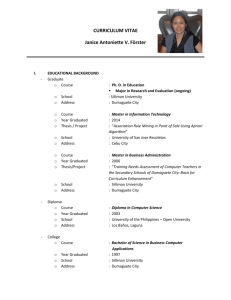Course Syllabus - Sonoma State University
advertisement
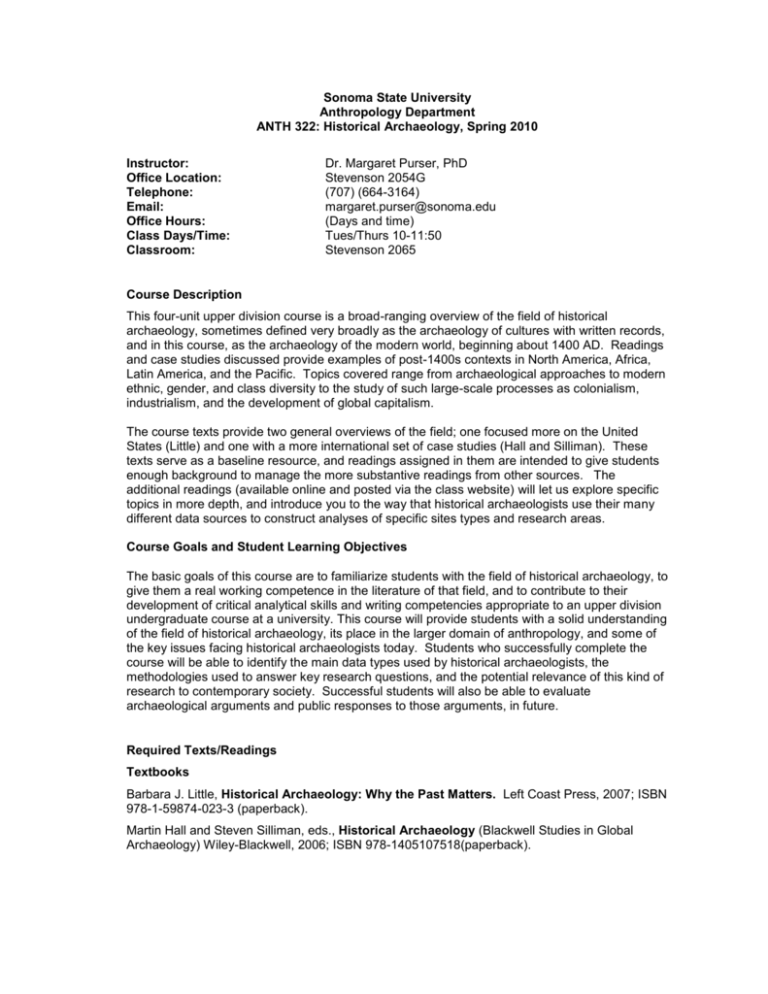
Sonoma State University Anthropology Department ANTH 322: Historical Archaeology, Spring 2010 Instructor: Office Location: Telephone: Email: Office Hours: Class Days/Time: Classroom: Dr. Margaret Purser, PhD Stevenson 2054G (707) (664-3164) margaret.purser@sonoma.edu (Days and time) Tues/Thurs 10-11:50 Stevenson 2065 Course Description This four-unit upper division course is a broad-ranging overview of the field of historical archaeology, sometimes defined very broadly as the archaeology of cultures with written records, and in this course, as the archaeology of the modern world, beginning about 1400 AD. Readings and case studies discussed provide examples of post-1400s contexts in North America, Africa, Latin America, and the Pacific. Topics covered range from archaeological approaches to modern ethnic, gender, and class diversity to the study of such large-scale processes as colonialism, industrialism, and the development of global capitalism. The course texts provide two general overviews of the field; one focused more on the United States (Little) and one with a more international set of case studies (Hall and Silliman). These texts serve as a baseline resource, and readings assigned in them are intended to give students enough background to manage the more substantive readings from other sources. The additional readings (available online and posted via the class website) will let us explore specific topics in more depth, and introduce you to the way that historical archaeologists use their many different data sources to construct analyses of specific sites types and research areas. Course Goals and Student Learning Objectives The basic goals of this course are to familiarize students with the field of historical archaeology, to give them a real working competence in the literature of that field, and to contribute to their development of critical analytical skills and writing competencies appropriate to an upper division undergraduate course at a university. This course will provide students with a solid understanding of the field of historical archaeology, its place in the larger domain of anthropology, and some of the key issues facing historical archaeologists today. Students who successfully complete the course will be able to identify the main data types used by historical archaeologists, the methodologies used to answer key research questions, and the potential relevance of this kind of research to contemporary society. Successful students will also be able to evaluate archaeological arguments and public responses to those arguments, in future. Required Texts/Readings Textbooks Barbara J. Little, Historical Archaeology: Why the Past Matters. Left Coast Press, 2007; ISBN 978-1-59874-023-3 (paperback). Martin Hall and Steven Silliman, eds., Historical Archaeology (Blackwell Studies in Global Archaeology) Wiley-Blackwell, 2006; ISBN 978-1405107518(paperback). Other Readings In addition to the textbooks, students will be assigned additional readings from the literature of the field. Journals used will include Historical Archaeology, International Journal of Historical Archaeology, Journal of Social Archaeology, and Journal of World Archaeology. All additional required readings will be available electronically, and will be posted on the course website. Classroom Protocol Dropping and Adding Students are responsible for understanding the policies and procedures about add/drops, academic renewal, etc. Information on add/drops are available at http://www.sonoma.edu/ar/registration/addclasses.shtml. Students should be aware of the current deadlines and penalties for adding and dropping classes. [Last day to add or drop for Spring 2010 is February 12; see full calendar details at http://sonoma.edu/ar/calendars/index.shtml] Course Requirements Generally speaking, the course will be organized into Tuesday lectures, and Thursday discussion and question and answer sessions. Because of the amount of reading for this course, keeping up with the reading is critical. To help students stay current, four sets of reading assignments will require a two-page written "response" paper, that describes the main points the author/authors are trying to make, and comes up with one substantive question, relating to the material. This assignment is spelled out in greater detail in a separate handout, on the course website). There are four of these response papers, due on Feb. 13, Mar. 6, April 17, and May 8. In addition, there is also a take-home essay midterm (Mar. 27), and a final paper (due May 20). This paper will be a literature review of a specific topic, theme, or subject area in historical archaeology. Due dates for the topic selection, initial bibliography, and paper outline are specified below, in the course calendar. (More details coming in additional handouts) The final paper and group presentation participation will serve in lieu of a final exam. The workload for this course is divided as follows: Written response papers (cumulative) Midterm Final paper Final presentations = 40% of grade = 20% of grade = 30% of grade = 10% of grade Grading Policy Grading on this course will be based on specific criteria, which will be covered in a separate handout for each assignment. In general, these criteria stress the organization of the written work, the way that the writer has used specific examples from the reading to support a clearly stated main point or argument, and the basic mechanical writing skills demonstrated (eg. spelling, grammar, etc.). Because the work here is predominantly qualitative in nature, it is very important that we all have a clear idea of mutual expectations, very early on in the course. If you have any questions at all about the point breakdown above, the course pedagogy, or the grading criteria being employed, please don't hesitate to discuss it with me, as early in the semester as possible. Please note that all due dates are firm, and late assignments cannot be submitted without affecting your grade. Specifically, unless some other arrangement has been made IN ADVANCE, each day late will reduce the possible point value of the grade for that assignment by five points. University Policies Academic integrity Students should know that the University’s Cheating and Plagarism policy is available at http://www.sonoma.edu/UAffairs/policies/cheating_plagiarism.htm. Your own commitment to learning, as evidenced by your enrollment at Sonoma State University and the University’s policy, require you to be honest in all your academic course work. Instances of academic dishonesty will not be tolerated. Cheating on exams or plagiarism (presenting the work of another as your own, or the use of another person’s ideas without giving proper credit) will result in a failing grade and sanctions by the University. For this class, all assignments are to be completed by the individual student unless otherwise specified. Campus Policy on Disability Access for Students "If you are a student with a disability and you think you may require accommodations, please register with the campus office of Disability Services for Students (DSS), located in Salazar Hall Room 1049, Phone: (707) 664-2677, TTY/TDD: (707) 664-2958. DSS will provide you with written confirmation of your verified disability and authorize recommended accommodations. This authorization must be presented to the instructor before any accommodations can be made.". The policy can be found at http://www.sonoma.edu/uaffairs/policies/disabilitypolicy.htm Emergency Evacuation If you are a student with a disability and you think you may require assistance evacuating a building in the event of a disaster, you should inform your instructor about the type of assistance you may require. You and your instructor should discuss your specific needs and the type of precautions that should be made in advance of such an event (i.e. assigning a buddy to guide you down the stairway). We encourage you to take advantage of these preventative measures as soon as possible and contact the Disability Services for Students office if other classroom accommodations are needed. SSU Writing Center The SSU Writing Center is located in Schulz 1103. The Writing Center helps SSU students, faculty, and staff members (as well as members of the wider community) become better writers and produce better written documents. The Writing Center website is located at http://www.sonoma.edu/programs/writingcenter/default.html. Course Schedule Week Date Topics, Readings, Assignments, Deadlines 1 2/2-2/4 Introduction to course, basic definitions. Assigned reading: Little, pp. 1340; Hall and Silliman ch. 1 (for Thursday). 2 2/9-2/11 What do we care about? How do we do what we do? Assigned reading: Little, section 2; Galloway, ch. 3 in H & S. Final paper assignment distributed 2/11. 3 2/23-2/25 Mrozowski, ch. 2; Pauls, ch. 4 in H&S. First reading response (on Galloway, due 3/11. Week Date Topics, Readings, Assignments, Deadlines 4 3/2-3/4 Palus et al, ch. 5 in H&S; additional reading* 5 3/9-3/11 Public archaeology and community engagement. Little section 4; additional readings* 6 3/16-3/18 Windshield survey: themes and issues. Little, section 3; Silliman, ch. 8 in H&S. Second reading response due 3/18. 7 3/23-3/25 Voss, Wurst (chs 6,10) and Burke, DeCunzo (chs 7,9) 8 3/30 (NO CLASS 4/1) Midterm review and midterm exam distributed 3/30. FURLOUGH DAY Thursday 4/1 9 SPRING BREAK April 5-April 9 10 4/13-4/15 Latin America: Exams due Monday, 4/13. Funari in Hall and Silliman, ch. 11; additional reading* 11 4/20-4/22 Africa: Pikirayi in H&S, ch. 12; additional reading* 12 4/27-4/29 North America: Loren and Beaudry, ch. 13, and Lightfoot, ch 14, in H&S. Third reading response due 4/29. 13 5/4-5/6 Pacific/Asia: Lydon, ch. 15 in H&S; additional reading* 14 5/11-5/13 Europe: Johnson, ch. 16 in H&S; additional reading* 15 5/18-5/20 Presentations. First reading response due 5/20. Final Exam Tuesday May 25 11-12:50, Stevenson 2065


